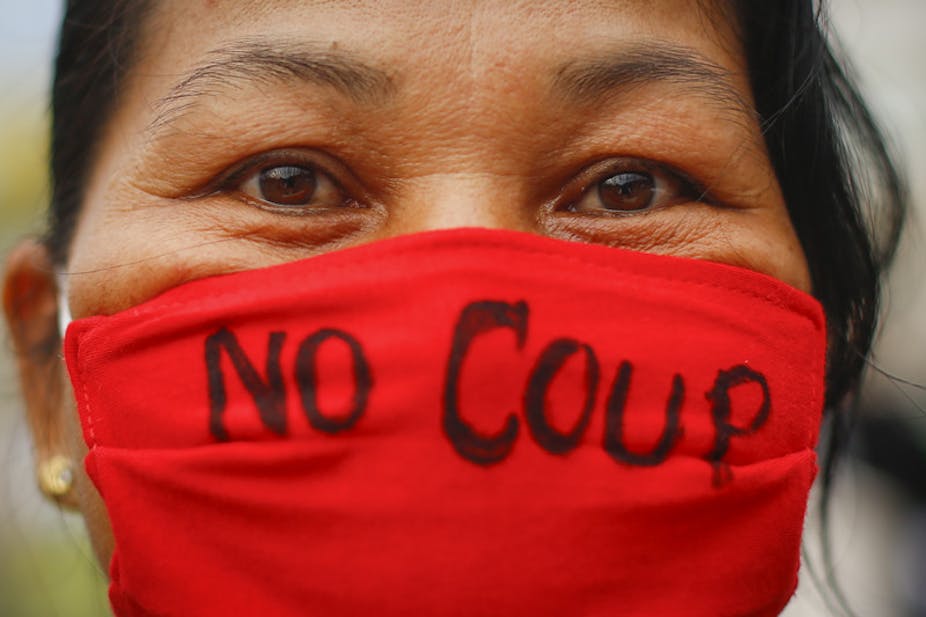Not all Thais have reacted with anger and dismay to the military takeover of their country. In fact, for those on the anti-government side, these are welcome developments. But that is no reason not to worry about the fate of Thai democracy – far from it.
The imposition of martial law on May 20 and the full coup d’état two days later have been celebrated by those bent on bringing an end, once and for all, to the political power of Thaksin Shinawatra and the political voice of his supporters.
Thaksin was removed from office in the coup of September 2006, and has been forced to live in exile ever since. In the intervening years, governments installed by his opponents have incurred the wrath of his Red Shirt supporters, while Thaksin-affiliated governments have provoked demonstrations by the opposing Yellow Shirts.
Once known as the People’s Alliance for Democracy (the PAD), Yellow Shirt sentiments have more recently been expressed in seven months of street protests led by the People’s Democratic Reform Committee (PDRC), spearheaded by former Democrat MP Suthep Thaugsuban.
What the PDRC was unable to achieve on its own was ultimately effected by the rulings of the Election Commission and the Constitutional Court. And days after Yingluck’s removal from office by the judiciary, parliament was dissolved by the military.
The anti-Thaksin opposition has largely celebrated these moves – but at what price to the survival of Thailand’s fragile democracy?
Clampdown
At the heart of Thailand’s political crisis is the fundamental question of how highly Thai society values egalitarianism and freedom of expression. In cultural terms, what remains to be seen is whether all Thais, rural poor and urban middle class alike, will share the right to have their voices heard.
To judge by the military’s approach to Thai civil society, the prognosis is not good. In the post-coup clampdown on freedom of expression, it is not just politicians on both sides of the divide who have been ordered to report to the military in recent days: so too have a string of Thai academics, journalists and writers whose outspoken opinions are now considered destabilising.
Among them was Pravit Rojanaphruk, journalist at English-language newspaper The Nation, who turned himself in to the military on May 25, symbolically taping his mouth shut with a black cross and placing his hands over his eyes.
Others have been less compliant. Renowned author and activist Wat Wanlyangkun, who began writing as a teenage university student in the heyday of the Thai democracy movement in 1973, has declined to present himself, running the risk of a two-year prison sentence. His contemporary, Phue Thai MP Chaturon Chaisaeng, came out of hiding on May 26 to give a press conference at the Foreign Correspondents Club in Bangkok – where he was promptly arrested. He will now be tried in a military court.
But Wanlyangkun and Chaisaeng are no strangers to being on the “wrong side” of martial law. Both became members of the Communist Party of Thailand (CPT) in the latter half of the 1970s, after a crackdown on student activism that culminated in the bloody attack on protesters at Thammasat University on 6 October 1976. Those who were not arrested or tortured, beaten and killed by the rightist mob fled the capital to join forces with the CPT in the jungles of Thailand’s north, north-east and south. There they remained until they were offered amnesty by the Thai state at the start of the 1980s.
The hatred that fuelled the vigilante violence against radical students in 1976 sprang from a dehumanising worldview that labelled them as “un-Thai” and calls for them to be lynched. Disturbingly, the same nationalist mindset abounds in Thailand today, with social media used to express livid hatred towards those daring to voice dissent at the military takeover.
Many see a real threat in this toxic climate. As one Thai academic posted on Facebook in recent days:
It may be understandable that people want a society in which everyone agrees with each other and wants to eliminate all those who see things differently but this is an ideal that is impossible to achieve. How is it possible for millions of people to all be of the same opinion? It’s one thing disagreeing, but another to cross the line into hatred and a total lack of empathy.
Hate speech succeeds in its aim of spreading fear, censoring freedom of expression and stifling debate in the name of peace and order. It is part of a wider state project in which Thailand, under military rule, seeks to “put its house in order”.
That house has no room for criticism or dissent; it is built on older foundations, intolerant of multiple voices and with thick curtains covering the windows to the outside world.

